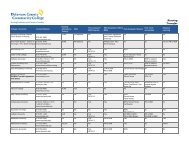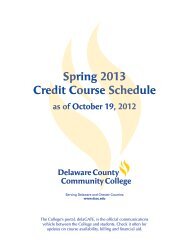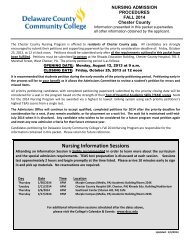2010 Catalog - Delaware County Community College
2010 Catalog - Delaware County Community College
2010 Catalog - Delaware County Community College
You also want an ePaper? Increase the reach of your titles
YUMPU automatically turns print PDFs into web optimized ePapers that Google loves.
78 COURSE DESCRIPTIONS<br />
Upon successful completion of this course, students<br />
should be able to:<br />
• Define domestic violence and related concepts<br />
• Identify and explain the criminal laws designed to punish<br />
perpetrators and protect victims of domestic violence<br />
• Identify and explain the scope of civil remedies to<br />
domestic violence<br />
• Identify and explain legal proceedings associated with<br />
domestic violence cases<br />
• Identify governmental and social services available to<br />
assist victims of domestic violence<br />
Prerequisite: None<br />
3 Credits 3 Weekly Lecture Hours<br />
ADJ 223<br />
White Collar Crime<br />
This course centers on the analysis of non-violent<br />
criminal behavior that uses the assumption of trust to<br />
engage in criminal conduct. Topics of discussion include:<br />
public corruption, fraud against the government, environmental<br />
crimes, corporate fraud, and other types of criminal<br />
deception to include computer fraud are also discussed.<br />
Upon successful completion of this course, students<br />
should be able to:<br />
• Define the term "White Collar Crime".<br />
• Identify the various types of White Collar Crime.<br />
• Explain the impact of White Collar Crime on the<br />
national and international economy.<br />
• Provide investigative strategies for the White Collar<br />
Crime investigator.<br />
• Discuss victim-offender relationships and vulnerability<br />
of victims.<br />
• Discuss governmental and corporate strategies<br />
employed to reduce White Collar Crime.<br />
Prereq. ADJ 120<br />
3 Credits 3 Weekly Lecture Hours<br />
AADJ 225 Ethics in Criminal Justice<br />
This course is designed to examine the professional<br />
standards of conduct and the acceptable forms of behavior<br />
within organizations in the criminal justice system. Issues<br />
concerning corruptions, perjury, false reporting, accepting<br />
of gratuities, excessive force and the code of silence will be<br />
examined. Personal and organizational integrity will be<br />
emphasized in this course.<br />
Upon successful completion of this course, students<br />
should be able to:<br />
• Define codes of conduct based on law and procedure.<br />
• Identify personal beliefs as a source of personal conduct.<br />
• Define social customs and its role in behavioral constraint.<br />
• Identify philosophical-logical systems that define ethics.<br />
• Organize a systematic way of clarifying ethical decisions.<br />
• Understand the role of professional codes of ethics.<br />
• Identify professional issues within the context of ethics<br />
Prereq. ADJ 101 and ADJ 110<br />
3 Credits 3 Weekly Lecture Hours<br />
ADJ 240<br />
Criminology<br />
An examination of the field of criminology, including<br />
classical and contemporary theories, nature and causes of<br />
crime and criminal behavior. Patterns of criminal behavior,<br />
including property crimes, violent crimes, organized<br />
crime, white-collar crime, and victimless crime are<br />
discussed. A critical assessment of criminal justice<br />
system and its ability to respond to crime as a social<br />
problem is conducted.<br />
Upon successful completion of this course, students<br />
should be able to:<br />
• Differentiate between the legal and non-legal definitions<br />
of crime and the criminal.<br />
• Identify the various indices of crime in America.<br />
• Trace the historical evolution of law and crime in<br />
western societies from a private to a public concern.<br />
• Explain the major theories of crime causation.<br />
• Identify the components, roles and functions of the<br />
criminal justice system in terms of the sociology of law<br />
and the administration of justice.<br />
3 Credits 3 Weekly Lecture Hours<br />
ADJ 250<br />
Contemporary Police Services<br />
An examination of the foundations of police services<br />
that include both patrol and investigative functions. The<br />
course is directed to analysis and commentary of<br />
municipal police as an agency of law enforcement and<br />
human services delivery. Topical areas include training,<br />
enforcement procedures, structure and organization,<br />
philosophy and contemporary issues regarding stress,<br />
unionization, employment practices, youth problems,<br />
human relation issues, corruption and accountability.<br />
Upon successful completion of this course, students<br />
should be able to:<br />
• Explain the distribution of police power within the U.S.<br />
governmental system.<br />
• Discuss the role, discretion and limits of police power in<br />
a democracy.<br />
• Explicate the importance of uniformed patrol in modern<br />
police service.<br />
• Analyze the dynamics of stress, perceptions of authority<br />
and communication in police-citizen encounters.<br />
3 Credits 3 Weekly Lecture Hours<br />
ADJ 260<br />
Corrections-Probation-Parole<br />
This course exposes students to the process of<br />
corrections-probation and parole. It includes an in-depth<br />
study of the historical evolution of the institutions,<br />
functions, organization and problems from antiquity to<br />
the present as well as the attendant philosophies of<br />
justice and punishment. Probation and parole as integral<br />
parts of the corrections process, and the two major<br />
rehabilitative techniques are discussed separately.<br />
Upon successful completion of this course, students<br />
should be able to:<br />
• Analyze the various theories that have been proposed<br />
relative to crime causality.<br />
• Identify and apply the various bases for corrections.<br />
• Trace the development of the correctional system in the<br />
United States.<br />
• Evaluate the rationale that corrections is one of society's<br />
agencies of social control that attempts to rehabilitate or<br />
neutralize criminal and delinquent behavior.<br />
• Identify and resolve the philosophical differences<br />
between custody and treatment of the offender.<br />
• Explore and analyze the various career opportunities<br />
within the corrections process.<br />
3 Credits 3 Weekly Lecture Hours<br />
ADJ 261<br />
The Youthful Offender<br />
An in-depth study of factors that relate to juvenile<br />
delinquency, prevention, treatment and control; a multidisciplinary<br />
orientation. The most popular interdisciplinary<br />
issues, ideas, principles and assumptions pertaining to<br />
delinquency are presented, as well as the duties, responsibilities<br />
and functions of the agencies in the criminal<br />
justice system that deal with the juvenile delinquent.<br />
Upon successful completion of this course, students<br />
should be able to:<br />
• Trace the history of the development of the concept of<br />
the delinquent child from World War II to the present.<br />
• Demonstrate that delinquency has social, psychological<br />
and legal causes.<br />
• Identify, describe and justify the major programs and<br />
processes that have been established by delinquency law.<br />
• Analyze the concept of the Youth Services Bureau.<br />
• Evaluate the legally required and discretionary<br />
responses of law enforcement agencies when dealing<br />
with the juvenile.<br />
• Trace the juvenile justice process from police contact<br />
through the various stages of intake, pre-disposition<br />
investigation, the family court hearings, disposition<br />
and confinement.<br />
• Analyze the strengths and weakness of incarcerating<br />
the adjudicated delinquent.<br />
• Assess the value of present after-care strategies.<br />
• Evaluate contemporary and future issues relevant<br />
to delinquency.<br />
3 Credits 3 Weekly Lecture Hours<br />
ADJ 262 U.S. Courts: Contemporary<br />
Issues and Problems<br />
This course provides students, particularly students of<br />
criminal justice, an overview of the legal basis, structure,<br />
organization, policies and jurisdiction of the U.S. courts.<br />
The course examines the dynamics of the U.S. courthouse,<br />
the interaction of the key participants and the quality of<br />
justice dispensed there. Finally, contemporary issues and<br />
problems such as judicial discretion, sentencing, political<br />
influence, plea negotiation, and the usurpation of the<br />
lawmaking process and power by the courts through<br />
judicial review are presented from both a philosophical<br />
and applied perspective.<br />
Upon successful completion of this course, students<br />
should be able to:<br />
• Identify the pivotal role of the courts in justice administration.<br />
• Provide an overview of the legal bases of the criminal<br />
courts, criminal procedure and criminal law.<br />
• Identify and evaluate the actors who, on a daily basis,<br />
must make the critical decisions through ministerial<br />
duties and discretionary powers to further social<br />
ordering in the U.S. courts.<br />
• List the most common functions of U.S. judges.<br />
• Follow the stages through which a criminal case must<br />
pass from arrest to the verdict and explain how and<br />
why cases leave the process.<br />
• Identify the competing theories of sentencing and<br />
discuss the legal basis for the wide range of<br />
discretionary power over sentencing by the judge.<br />
3 Credits 3 Weekly Lecture Hours<br />
ADJ 264<br />
American State Court<br />
Practicum<br />
This course will provide an experiential analysis of<br />
judicial decision making with an emphasis on the structure<br />
of, and interaction with, American trial procedure and<br />
litigation. In addition to reviewing the basic legal concepts<br />
that underlie American state courts, students examine<br />
actual court decisions and observe the findings of judges,<br />
juries, prosecutors, defense attorneys, defendants and<br />
other key actors in the judicial process. This course will<br />
provide students with a fundamental understanding of<br />
courtroom procedure, and the theory underpinning the<br />
Rules of Civil and Criminal Procedure and the Rules of<br />
Evidence. The dynamics of a state courthouse, the<br />
interaction of the key participants, and the quality of<br />
justice dispensed there and the power of the courts<br />
through judicial review are presented from both a<br />
philosophical and applied perspective.<br />
Upon successful completion of this course, students<br />
should be able to:<br />
• Identify the pivotal role of the courts in justice<br />
administration.<br />
• To provide students with a fundamental look at the<br />
process of litigation.<br />
• To challenge students to develop creative alternatives to<br />
resolving disputes in criminal and civil areas.<br />
• Identify and evaluate the actors who, on a daily basis,<br />
must make the critical decisions through ministerial<br />
duties and discretionary powers to further social<br />
ordering in the American courts.<br />
• Identify the challenges faced by judges.<br />
DELAWARE COUNTY COMMUNITY COLLEGE

















